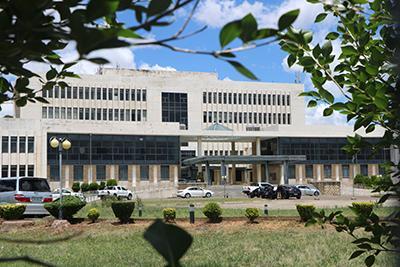Africa-Press – Lesotho. Parliament has adopted a motion calling for a ban on the importation of bottled water into the country in a move meant to empower the local industry.
Thuathe No. 26 MP, Hon Voeswa Tsheka moved the motion, seconded by Hon Itumeleng Rantsho. It was brought forward as a continuation of a debate that had previously been adjourned.
Tsheka moved: “That this Honourable House resolves to urge the Government of Lesotho to impose an embargo on the importation of bottled still water pursuant to Article 25 of the Southern African Customs Union (SACU) Agreement, to capacitate and build the water bottling industry in the country.”
Article 25 of SACU on Import and Export Prohibition states: “(1) Member States recognize the right of each Member State to prohibit or restrict the importation into or exportation from its area of any goods for economic, social, cultural or other reasons as may be agreed upon. (5) Member State shall co-operate in the application of import restrictions with a view to ensuring that the economic objectives of any import control legislation in any State in the Common Customs Area are attained.”
She said, if implemented, the motion will empower local businesses, which have the necessary capacity to meet demand.
Tsheka explained that once the ban is in place, those wishing to trade with the country would need to establish their bottling plants locally, citing Botswana as an example, where bottled water is produced by local companies and even foreign firms are required to set up their plants within the country.
She shared with the House about her tour to some companies and was confident of their capacity. One such company told her that it can produce up to 2,000 bottles per hour. However, due to intense competition from foreign brands, they are often unable to operate at full capacity.
“They said they are only doing it to meet the current demand,” she added.
She added that both WASCO and the NUL Innovation Hub have the capacity to test the quality of this water, which could be sourced from natural springs or tap water, then purified and bottled for consumption.
Supporting the motion, Hon ‘Makatleho Motsoasele said this move would restore the “dignity” of the country. “Take for instance a situation whereby one is hosting a visitor who wants local water, and we give them imported water instead.”
Motsoasele added that this decision would also strengthen the local value chain, saying freight services companies would benefit from transporting local water. She called for compliance with industry hygiene standards to ensure high water quality.
Hon ‘Mabafokeng Mpobole echoed her support, saying health inspectors should regularly assess the fountains from which the water is sourced and produce reports at least every six months on its safety for consumption. She also called for a thorough study to identify viable locations with sustainable fountains to support the business model.
This, she said, would empower communities and help address unemployment.
Hon Edwin Sehlabaka urged the government to table its plans before the august House.
“The country should see to it that it first improves the lives of its citizens. This should happen before the budget is tabled in the House,” he said.
He warned that a lack of political will could hinder the implementation of the motion, even if it had passed.
Prof Nqosa Mahao, who also seconded the motion, stressed the need for strong political will to see the motion through to implementation.
Hon Tefo Mapesela, a former Minister of Trade, said under Prime Minister Motsoahae Thabane, there was already a ban on imported water, which was never officially lifted.
He said he had implemented the embargo at the border, and there had never been a trade war between Lesotho and South Africa. He blamed Revenue Services Lesotho (RSL) officials for allowing bottled water imports to continue despite the embargo still being “effective”.
“The law is not the Minister. This has never been revised,” he added.
Responding to the debate, the Minister of Trade and Business Development, Hon Mokhethi Shelile, said he would investigate the matter to establish whether implementation of the ban is ongoing.
He remarked that the motion aligns with SACU provisions, which advocate for the protection of infant industries.
The Minister committed to implementing border embargoes as per SACU regulations and pledged his ministry’s support for the local bottled water industry.
Dr Tšeliso Moroke, however, said the mover of the motion should have conducted thorough research and would have discovered that an “active embargo” on bottled water products already exists.
Qenase Tsaeeng from the Hydrate Still Water company expressed her support for the proposed move, adding that she is pleased with its potential to bring more business, especially as their company is new in the industry.
“It’s a positive development for us, and it means more employment opportunities,” she said.
Deputy Speaker of the National Assembly, Tšepang Tšita-Mosena, clarified that the motion does not contradict what Mapesela said, but reinforces it.
“As you recall, the resolutions of this House call for implementation,” she said, urging the Minister to update the House on the motion’s implementation.
She also called on the Minister to bring to the House progress on implementing Section 34, which reserves about 50 business activities for Basotho.
She urged the Deputy Prime Minister, who also serves as the Leader of the House, to ensure that Cabinet members report back on resolutions passed by Parliament.
For More News And Analysis About Lesotho Follow Africa-Press






